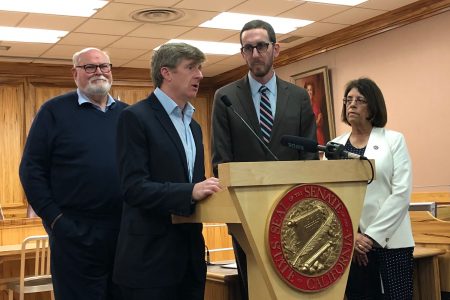Two new bills in California would prohibit insurers from limiting benefits and coverage for chronic conditions and requiring prior authorization for medication-assisted treatment
Last week, former U.S. Rep. Patrick J. Kennedy, founder of The Kennedy Forum, joined Sen. Wiener, Sen. Beall, and Asm. Aguiar-Curry in California to introduce two new mental health parity bills cosponsored by The Kennedy Forum and the Steinberg Institute. These bills will help ensure that Californians can receive treatment for mental health and substance use disorders early on—thus saving lives, reducing homelessness, and decreasing costs to the state, communities, and taxpayers.
Senate Bill 855 strengthens the California Mental Health Parity Act, requiring insurance companies to cover all medically necessary mental health and substance use disorder treatment. Currently, the Act only applies to nine severe mental illnesses.
SB 855 is a direct response to the recent Wit v. UBH decision, in which the U.S. District Court in the Northern District of California found that UBH used flawed medical necessity criteria that were inconsistent with generally accepted standards of behavioral health care to wrongly deny coverage for medically necessary mental health and addiction treatment.
By using a definition of medical necessity that is consistent with generally accepted standards of care, this bill represents an important step toward ending the practice identified in the Wit decision where UBH denied coverage as “not medically necessary” in order to mitigate the Federal Parity Act.
The bill would also require insurers to use medical necessity criteria from non-profit clinical specialty associations, such as the American Society of Addiction Medicine (ASAM). All parties’ expert witnesses in the Wit case identified these non-profit criteria as consistent with generally accepted standards of care.
SB 855 also contains provisions that would give meaningful remedies to patients wrongly denied medically necessary care by putting in place a private right of action.
Complementing SB 855, Senate Bill 854 prevents commercial health plans from requiring prior authorization or “step therapy” when a patient is in need of an FDA-approved medication to treat a substance use disorder, including medication-assisted treatment (MAT).
By banning prior authorization and step therapy requirements for such medications, California will save lives. In one survey by the California Society of Addiction Medicine, more than half of doctors reported that insurers put in place significant barriers to medication-assisted treatment for their patients. When California’s MediCal program got rid of prior authorization for buprenorphine, the use of this life-saving medication nearly quadrupled. SB 854 also requires that FDA-approved medications for substance use disorders be placed on the lowest cost tier, which is important because the high cost of MAT can reduce access.
The introduction of these critical pieces of legislation represents major progress in the fight for mental health equity in California. Our hope is that other states will take notice and initiate similar steps to prioritize access to mental health and addiction care for their own residents.
We applaud Sen. Wiener, Sen. Beall, and Asm. Aguiar-Curry for their dedication and leadership on this issue.
Watch a video of the press conference in California here.

The Kennedy Forum would like to thank Sutter Health for generously supporting work to advance mental health parity in California.
Struggling with health insurance coverage for mental health or addition challenges?
Visit The Kennedy Forum’s “Don’t Deny Me” website to learn more about patient rights under the Federal Parity Law and get connected to essential appeals guidance and resources. www.DontDenyMe.org


